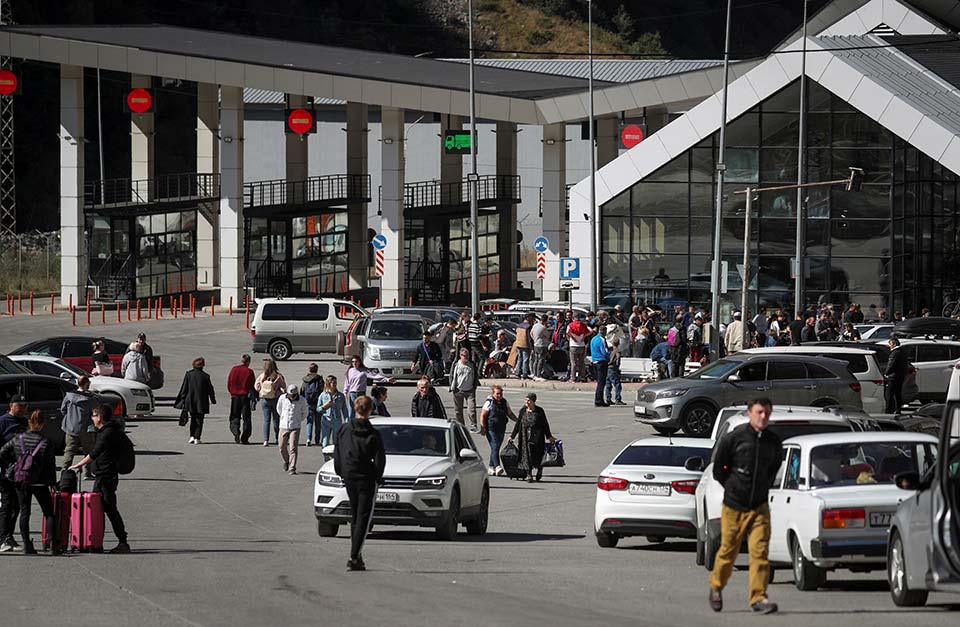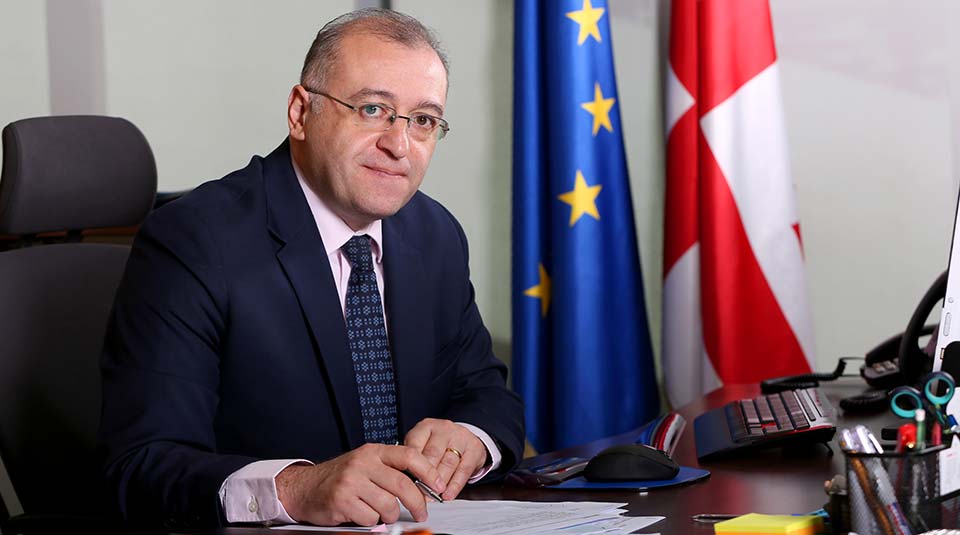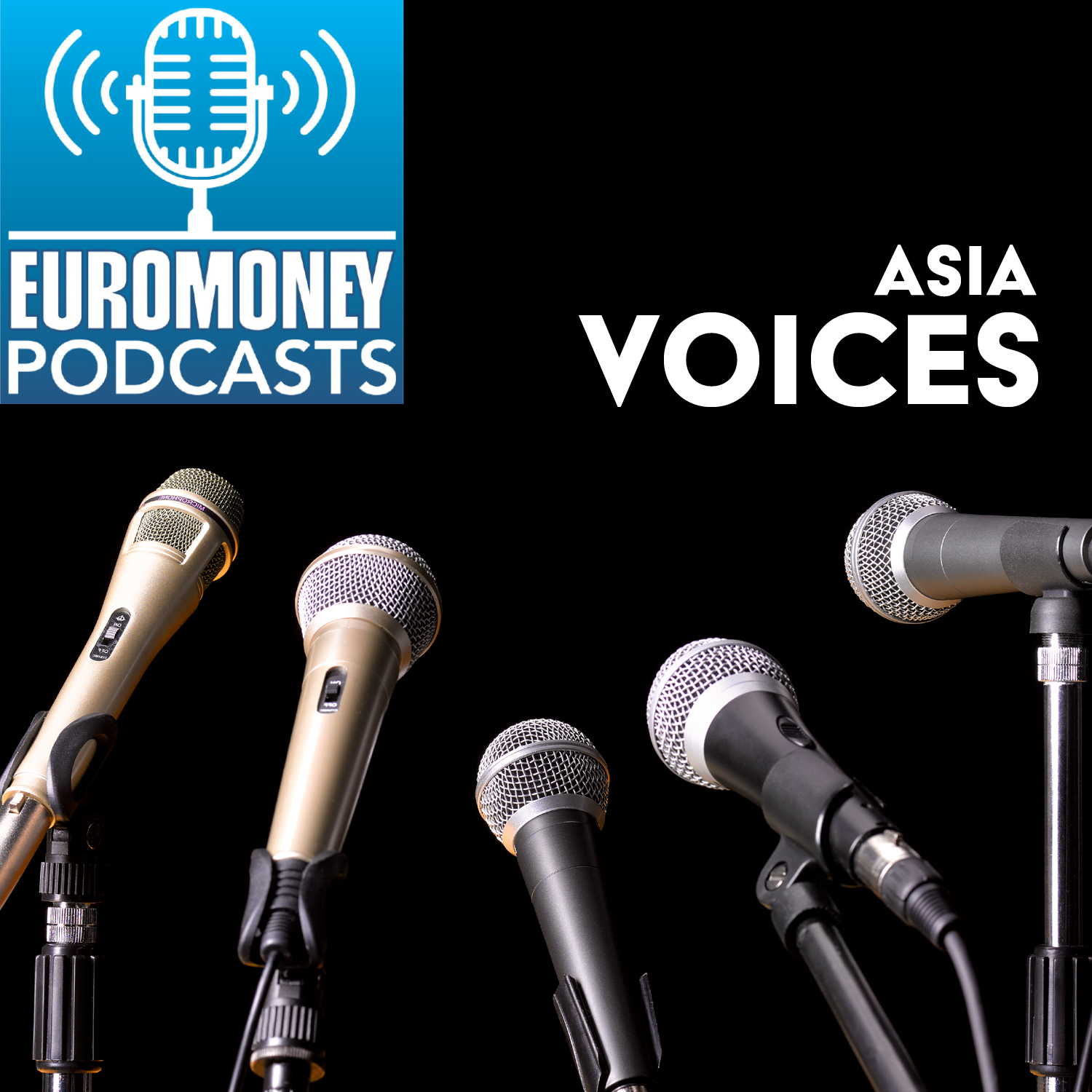An interview with Koba Gvenetadze
Every central bank governor in the world has had a tough 2022 – a tough three years, in fact – but imagine being governor of the National Bank of Georgia.
You must deal with the same things everyone else does, from a global pandemic to inflation to the threat of worldwide recession and an enduring supply-chain crisis. But you also have to deal with war on your border, a war prosecuted by your neighbour with a track record of annexing your own territory.
“These past couple of years have been very turbulent for everyone,” says governor Koba Gvenetadze, who has been in this unenviable position.
Covid-19, and the adjustments required in moving to the aftermath of the pandemic, were bad enough.
“And the environment became even more difficult after Russia’s unprovoked invasion of Ukraine and full-scale war,” he says. “Georgia has been invaded by its neighbour; currently 20% of the country is occupied by Russia.”
Adverse spillovers from the war in Ukraine thus far have generally been less impactful than expected earlier
James John, IMF
And yet something very strange has happened. The IMF was in Tbilisi in November to review Georgia’s economic reform programme; it delivered a glowing report on November 7 in which it predicted 10% economic growth for the country in 2022, roughly in line with 10.5% expected inflation.
Part of the reason is hard work by Georgia’s central bank and government on financial reform. But there’s another, deeply unexpected spur: the war.
James John, leading the IMF team in Tbilisi, laid it out clearly.
“Adverse spillovers from the war in Ukraine thus far have generally been less impactful than expected earlier,” he said in a statement on November 7. “Buoyant tourism revenues, a surge in immigration and financial inflows triggered by the war, and a rise in transit trade through Georgia come on the heels of a robust recovery from the pandemic and have lifted growth and fiscal revenues, strengthened the current account balance and the [Georgian currency] lari, and supported accumulation of foreign currency reserves.”
You might want to pause on the bit of that that says “a surge in immigration.”
That surge is Russians leaving Russia to avoid the war.
“There were inflows of migrants into Georgia in two waves,” says Gvenetadze. “One part after the war started and the second part when mobilization was announced in Russia.”
That’s right: Russians fleeing their own war have become a key economic driver of the country they invaded before Ukraine.
Positive immigration
There’s a certain poetic justice to this, though who knows how long it will last. At least 112,000 Russians are known to have entered Georgia since the invasion began, a big number for a country with a population of 3.7 million.
More importantly, though, that number includes many skilled working-age men, tens of thousands of whom are thought to be tech workers. And they brought money with them too: more than $10 billion was transferred from Russia to Georgia between April and September, National Bank of Georgia says.
These are not poor refugees unable to contribute to the society in which they arrive. They are highly educated, productive workers who drive a consumption story.
That has further knock-on effects. Most developing countries have experienced capital flight and have had to burn through their own reserves in order to protect their currencies. Not so Georgia: these inflows of foreign currencies have instead bolstered reserves, and the currency has outperformed most peers.
If you look at the situation after this invasion, risk premia for the region as a whole has increased. That is why we need to be even more vigilant than before
Koba Gvenetadze, National Bank of Georgia
Aside from a brief shock in late February, the lari has steadily gained strength over the last 12 months against the US dollar – almost unique among emerging market currencies – and has soared against relevant trading partner currencies such as the euro, renminbi and Turkish lira.
It is not all good. Foreign inflows of people and money “have contributed to higher inflation at the same time as higher growth,” Gvenetadze says. “To put it another way, inflation could have softened more if not for this higher demand.”
It has led to higher costs for ordinary Georgians, and a trade shock.
“But these inflows of foreign exchange, together with a very strong recovery of tourists, contributed to a strong position of the Georgian currency and limited imported inflation in Georgia.”
Analysts have noted this too.
“Georgia and Armenia were the two countries which have benefited the most from the relocation of citizens and businesses from the region,” notes Renaissance Capital, which adds it has seen “lower than expected geopolitical risks in Georgia.”
All of this stands sharply at odds with what most of the world was expecting earlier in the year.
The European Bank for Reconstruction and Development, for example, said in March that it expected the invasion of Ukraine to be damaging to the Georgian economy, while the World Bank said the following month that GDP growth would probably end the year at 2.5%. It is probably going to be four times that now.

Side-effect
It is pleasing to think that Georgia’s success is an unintended side-effect of Russian aggression – the more so since Russia still occupies South Ossetia and Abkhazia, and has done so since 2008 – but that would be to do the central bank a disservice.
Georgia’s relative prosperity also owes a lot to decisions and convictions over a number of years.
“Generally, if you look at the situation after this invasion, risk premia for the region as a whole has increased,” Gvenetadze says. “That is why we need to be even more vigilant than before in terms of fulfilling our task, whether it’s price stability or, especially, financial stability.”
As with all central banks today, the condition of the economy and the banking system has a lot to do with the way both the banks and government approached Covid.
Gvenetadze prioritized financial stability, and as a result of those policies, he says, “the financial sector has gone through this difficult period of time quite successfully.
“You remember that uncertainty was very high, because nobody knew when the pandemic would end. With all the efforts we have been taking, we didn’t know how long we would need them, how long economies would stay closed and how long the problems for companies would last.
“But our approach has been always to fix the roof while the sun is shining.”
Specific examples of this include pre-pandemic measures such as imposing additional capital and liquidity requirements for banks, and adopting responsible lending regulation.
The right macro policies are the best insurance against these shocks
Koba Gvenetadze
The central bank implemented macroprudential measures to decrease loan dollarization – and therefore exposure to moving exchange rates – and put the country pretty much in line with Basel III parameters, with robust asset quality and solid capital and liquidity buffers across the system.
It is easy to look back on this as wise, but it wasn’t entirely supported at the time.
“The measures… were unpopular at the time we were implementing them, and from time to time, we had to defend them quite strongly, I have to say,” Gvenetadze says. “But at the same time, National Bank of Georgia is independent, and we have the power to do that.”
So, Covid-19 certainly hit the banking sector, but it remained robust; “a major locomotive of economic recovery,” says Gvenetadze, whose English is impeccable.
Asset quality across the system is improving, profitability is sound and financial indicators look good. Also, the banks are all thoroughly stress tested because of the pandemic, which is useful intelligence now that the source of stress has shifted instead to war.
As to the broader economy, like other nations, Georgia’s was boosted by government support. But there has also been a productive relationship with the IMF. Georgia had had an extended fund facility with the IMF for three years before the pandemic – it reached its eighth review in April 2021 – and when war broke out, the country sought a new precautionary facility, a $280 million standby arrangement that was formally approved in June 2022.
From the IMF’s perspective, this facility was to help Georgia to continue to do what it was already doing: entrenching macroeconomic stability, building resilience and pushing for medium-term growth.
From Georgia’s point of view, it had already learned from past experience how useful the presence of a facility, even if not required, is to have available.
“As our programme goes on, if there are needs for additional financing, this is very, very handy,” Gvenetadze says.
He describes the new June programme as providing “a discipline with economic policies. It will be used only in case we need to use it.”
Shock absorber
Gvenetadze believes that inflation peaked at 13.9% and has now been on a downward trend for three months; the bank projects it will reach the 3% long-term inflation target around the third quarter of next year.
An important element in this, he says, is that “we stayed committed to a floating exchange rate, which we think serves as a very good shock absorber.
“The exchange rate in Georgia moves in line with fundamentals.”
A strong currency isn’t always great – it doesn’t help a lot with exports – but it has allowed the bank to replenish the reserves it sold off in 2020 when the country’s vital tourism sector collapsed pretty much overnight in the pandemic.
“We lost about $3 billion in foreign exchange inflows, which was about 18% of GDP; very important for developing countries.”
That now feels like the distant past.
“Whenever good times came, we started to buy reserves.”
The central bank and the government have also turned to state-owned enterprise reform, “which will be really very important for the increase of efficiency of these organizations, and also very good for capital market reform.”
Georgia has never hidden its aspiration towards Europe. And that is what the nation wants
Koba Gvenetadze
All of this is helpful, but there’s also a message being sent here, and glowing words from the IMF help to transmit it.
“This is our signal to international communities,” Gvenetadze says. “This is our signal to investors who are interested in Georgia that we are conducting the right macro policies. There might be shocks from time to time. But the right macro policies are the best insurance against these shocks.”
The best endorsement of this progress would be from the rating agencies, which began to turn more favourable towards Georgia around 2017 (although Moody’s, for one, turned Georgia’s outlook from stable to negative in April and has not yet changed it back).
Today Georgia is two notches below investment grade, and Gvenetadze very much hopes those two notches can be gained. “I’m sure that by preserving macro stability and implementing reforms we will be able to achieve this goal.”
There is another goal in the background too: European Union membership. In 2016, Georgia signed an Association Agreement with the EU. This year, a formal application for membership was submitted, and the European Commission has established its eligibility to become a member.
These days, of course, there is a certain trepidation in a Russia-bordering country declaring affiliation with the EU. But Gvenetadze is unequivocal.
“For Georgia, the EU is our aspiration,” he says. “And the EU is where we think that we belong, and I’m sure we will be there.”
Shadow on the border
This is not ultimately the central bank’s call, but it is essential in terms of implementing reforms and performance that the EU would need to see in order to process membership. It will certainly be relevant to the central bank if Georgia joins the single euro payments area, Sepa; that official application has been submitted, “an important step on the path of Georgia’s European integration,” he says.
But what about that vast shadow on the border? Russia has reacted very badly to neighbouring states that gravitate towards the West.
“Well, Georgia has never hidden its aspiration towards Europe. And that is what the nation wants,” Gvenetadze says. “This is what is in our constitution. This is what we are working for.
“So, the threat is what it was before, it is here, and maybe it will be in the future. But I think the very important thing is that the international community is aware of the threat, this danger. And I very much hope that with the help of the international community, Georgia will be able to strengthen its position toward the EU.”
Relevant to this discussion is the fact that Georgia has adopted all sanctions against Russia in tandem with the US, EU and UK. That is a difficult step for a country like Georgia to take, given the scale of trade relations with Russia, but Georgia clearly saw it as essential to signal to the world where its allegiances lie.
Not only did it instruct all entities under its supervision to observe sanctions, and set up a dedication division to ensure observance.
“It was really important for us to make this step,” Gvenetadze says. “I think this will even strengthen Georgia’s positioning of the country, which makes sure that down the road, our policies and businesses will be protected from sanctions. So, we are doing our best in this direction.”






